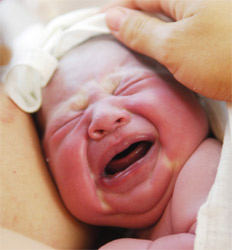There are many threats to our children’s health. The figures say it all. The World Health Organisation (WHO) states that approximately ten million children under five each year die from various diseases and infections.
Infectious diseases contribute significantly to this number. Amongst the many infectious agents that wreak havoc in our children’s bodies, Streptococcus pneumoniae is one that has much significance.
The bacterium, also known as pneumococcus, causes pneumococcal disease. This is a disease that can involve many organ systems. Invasive pneumococcal infections include meningitis (inflammation of the covering of the brain), pneumonia (inflammation of the lungs) and bacteraemia (blood infection). Among the common noninvasive manifestations are otitis media (ear infections) and sinusitis (sinus infection).
In this issue, we will look at meningitis, which is one of the more severe consequences of pneumococcus and how you can protect your child against it.
What is Meningitis?
Meningitis is an infection of the meninges, the thin lining that surrounds the brain and the spinal cord. It is usually caused by bacteria or viruses that infect the skin, gastrointestinal or respiratory tracts. These harmful pathogens then travel to the meninges through the bloodstream and cerebrospinal fluid (fluid that circulates in and around the spinal cord), causing inflammation of the meninges.
Viral or Bacterial?
Meningitis is most often caused by viral or bacterial infection. Determining if meningitis is caused by a virus or bacterium is important as the severity of illness and treatment differs depending on the cause.
Viral meningitis are more common but less severe. Most patients recover on their own within two weeks.
For bacterial meningitis, it can result in more severe consequences, such as brain damage, hearing loss, blindness and even, death. It also progresses quickly, making early diagnosis and treatment very important. Today, Streptococcus pneumoniae and Neisseria meningitidis are the leading causes of bacterial meningitis.
Is Your Child at Risk?
Most cases of meningitis occur in children younger than age 5. Children who attend daycare centers and other childcare facilities are also at an increased risk of meningitis. This is because meningitis is contagious and spreads through coughing, sneezing or sharing eating utensils or a toothbrush.
Detect Meningitis Early
Early symptoms of meningitis can easily be mistaken for the common cold or flu. The flu-like symptoms can be similar in both viral and bacterial meningitis. Since meningitis can be fatal, it is better not to take chances. Bring your child to the doctor right away if he displays any of the symptoms. The sooner you detect it, the better the chances of a recovery without severe complications.
The common symptoms of meningitis are:
- High fever
- Headache
- Photophobia (eye sensitivity to light)
- Stiff neck
- Confusion
- Vomiting
Babies with meningitis may not display the symptoms above. Instead, they may simply have a fever and become extremely irritable. You may find it difficult to comfort them, even when you pick them up and console them.
What to Do
If you suspect that your child has meningitis, bring him to the doctor immediately. The doctor will most likely do a lumbar puncture (spinal tap) to collect a sample of fluid from his spine. This fluid is then analysed for any signs of inflammation, as well as to determine the virus or bacteria causing the infection. Treatment depends on the cause of the meningitis.
If bacterial meningitis is diagnosed, the doctor will most likely begin intravenous (IV) antibiotics as soon as possible. Your child will also be watched carefully to prevent serious problems such as brain damage.
Protect Your Child
Meningitis is typically associated with contagious infections. As such, good hygiene can help prevent meningitis. Try taking these steps below: Teach your child to wash his hands often, especially before he eats and after using the toilet. Make sure your child gets enough rest, stays active, eats a healthy and well balanced diet to stay healthy. Prevent your child from sharing eating utensils with other children. Ensure all toys are kept clean.
Get Your Child Vaccinated!
The best way to protect your child from meningitis is through immunisation. Vaccines are effective in stimulating the body to produce antibodies against pathogens that cause meningitis.
- Haemophilus influenzae type b (Hib) vaccine. Studies have shown that the Haemophilus influenza type b (Hib) virus is the leading cause of bacterial meningitis in Malaysia. Since 2002, the Hib vaccination has been made compulsory for all babies in Malaysia.
- Pneumococcal conjugate vaccine (PCV). The PCV protects against 7 strains of pneumococcal bacteria. These strains are responsible for most severe pneumococcal infections among children and have since lowered the number of severe pneumococcal disease by nearly 80% among children under five (source: Center for Disease Control and Prevention or CDC). Currently, the PCV is an optional vaccine in Malaysia and can be obtained in private hospitals or clinics.
- Quadrivalent meningococcal vaccine. The bacterium Neisseria meningitidis causes meningitis and can trigger epidemics of meningitis. This vaccine is currently optional in Malaysia and is given to all who perform the Haji pilgrimage to Mecca.
Thanks to the increasing sophistication of medical technology, we are blessed with new innovations in vaccines. You can now look forward to the 10-valent pneumococcal conjugate vaccine, which has the potential to prevent 18% more of invasive pneumococcal diseases than the currently available 7-valent vaccine in Asia. It offers wider coverage against three additional pneumococcal strains and is designed to protect children against both invasive pneumococcal disease and non-invasive diseases such as otitis media. This vaccine will soon be made available in Malaysia. With such innovations, multiple diseases are preventable all at once, with fewer shots than if each vaccine were to be administered separately.
Immunisation can certainly go a long way to protecting your child against meningitis. So please ensure that your child gets all the standard immunisations recommended for children in Malaysia. Do not hesitate to seek advice from your doctor regarding optional vaccines as well.






Comments